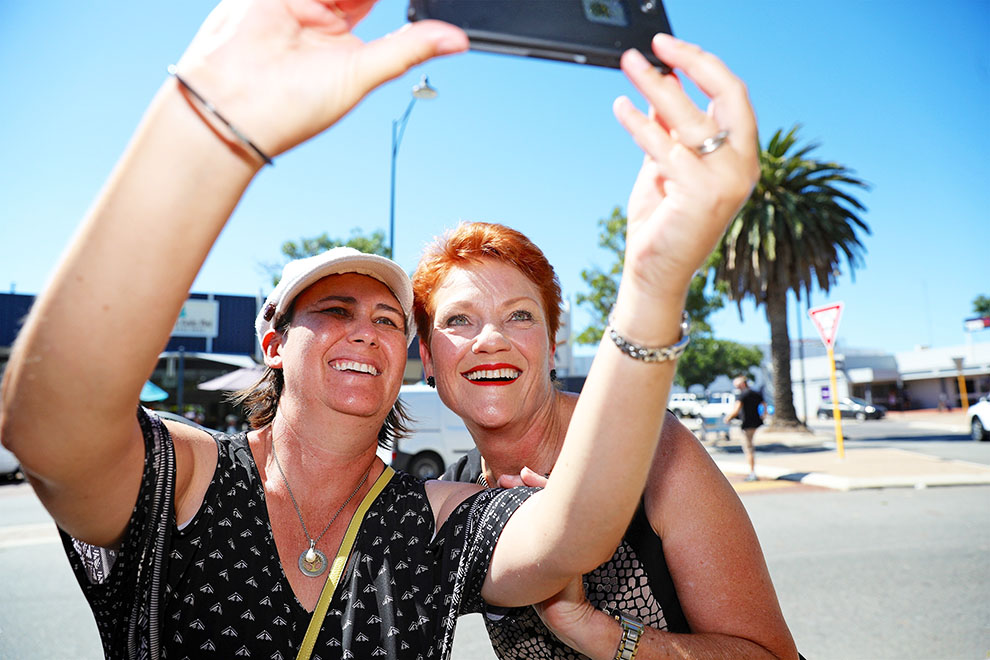Pauline Hanson is back. In line with “populist” parties across the globe, fuelled by despondency over plodding economies, Islamist terrorism and immigration crises, One Nation is on the rise, even hitting 10 per cent in the latest Newspoll.
With the party now controlling a large chunk of the Senate crossbench, the Malcolm Turnbull who opined before last year’s election that “Pauline Hanson is not a welcome presence on the Australian political scene” has been replaced by a more nuanced, equivocal individual.
In desperation, Western Australia’s Liberal Party has entered a preference deal with One Nation for tomorrow’s election, which at time of writing is being roundly viewed – through the prism of the published polls, aided by Liberal leaks – as a disaster for the Libs. (An unexpected result at the ballot box would transform it into a work of genius and wonder, of course.)
Much is made of the supposed contrast between today’s convictionless Liberals and John Howard’s “insistence” back in the late 1990s and early 2000s that One Nation be put last on how-to-vote cards, but that involves generous employment of the airbrush.
People with long enough memories will recall prime minister Howard’s reluctance to disagree publicly even with Hanson’s pronouncements on Asian immigration and Asians in general. He was certainly not at the forefront of his party’s move to put One Nation at the bottom of the ticket, instead being dragged there reluctantly after other Liberals (including deputy leader Peter Costello) announced their intentions – and especially after the June 1998 Queensland election result saw many urban Liberal supporters vote Labor out of abhorrence of the state Coalition’s preference deal with the minor party. (Behind the scenes, as we subsequently learnt, Howard had sicked Tony Abbott onto Hanson.)
Back then, Howard was the subject of some ferocious editorials in Asian newspapers about his cosying up to Hanson. There’s none of that today, perhaps because Turnbull does put on the record his opposition to her utterances from time to time. And Hanson’s vitriol has shifted from “Asians” to “Muslims,” which is unlikely to greatly offend our largest trading partner, China, at least.
One Nation only contested one-in-ten lower house seats last year; the party’s primary votes for the Senate, 4.3 per cent nationally and 9.2 per cent in Hanson’s home state of Queensland, were lower than the levels it reached in 1998 and 2001. The party has a record four Senate spots today mostly because 2016 was a double-dissolution election (and partly thanks to the changed voting procedure for electing senators). Under a half-Senate election, only one One Nation senator would have been certain of election – exactly the number who won in 1998.
And you still need to go back to 1998 to find the party’s best polling, when it peaked at 13 per cent in Newspoll.
Much current analysis casts “Hanson supporters” as the equivalent of “Trump supporters” in America, but that needs breaking down. Donald Trump received 46 per cent of the national vote, which obviously dwarfs anything One Nation could hope to achieve. Importantly, he hijacked the Republican Party and rode it to power. As a minor party candidate or independent insurgent he would not have got within cooee of the Oval Office.
So when people refer to “Trump supporters” – Hillary Clinton’s disastrous “deplorables” formulation during the campaign is an example – they presumably have in mind the hardcore minority who adore him. The bulk of his vote came from people who backed him simply because he was the Republican candidate – including the majority who voted for someone else in the primaries – and many did so through clenched teeth. Trump was, after all, the most unpopular presidential candidate in polling history, and is currently the least-approved of newly installed presidents.
That’s why, despite the hype, most high-income voters supported Trump, and Clinton was the favourite among low-income ones. But the enduring Republican–Democrat divide was narrower than usual, thanks in particular to those members of the much-hyped “white working class” who turned out in droves and swung big to the Republicans.
It’s this small minority of the voting public that can best be compared with One Nation supporters.
Fairfax columnist Peter FitzSimons recently began an article by quoting “a respected political operative” who had assured him late last year that “Pauline Hanson will be prime minister within three years.” If this unnamed quotee truly is an “operative,” you have to pity the party for whom he or she operates. (“Respected” – let’s not even go there.)
A Hanson prime ministership could only conceivably come about if she, like Trump, was first installed as leader of a major party, which is all but impossible.
This week Hanson told Channel 7 she expected One Nation to win three seats in Western Australia’s Legislative Council (fair enough) and two in the Legislative Assembly (ludicrous). High expectations are fine for sustaining campaign oxygen, but eventually, when the votes are in, there must be a reckoning.
Recriminations flowing from a poorer-than-anticipated One Nation showing could be one of the highlights of Sunday’s post-mortem. •





